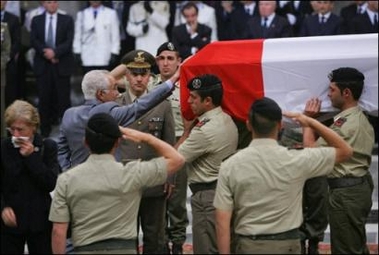Prodi: US will understand Italy's troop withdrawal from Iraq
(AFP)
Updated: 2006-06-16 14:40
The United States is not happy about the withdrawal of Italian troops from
Iraq but will accept the decision when it is fully explained to them, Italian
Prime Minister Romano Prodi said in Brussels.

Relatives touch the flag-draped coffin of
Corporal Alessandro Pibiri during a funeral mass for the Italian soldier
killed in action in Iraq, 9 June 2006 in St. Paul's Basilica in Rome. The
United States is not happy about the withdrawal of Italian troops from
Iraq but will accept the decision when it is fully explained to them,
Italian Prime Minister Romano Prodi said.
[AFP] |
Italian Foreign Minister Massimo
D'Alema was to meet his US counterpart Condoleezza Rice in Washington later
Friday and the issue was bound to be high on the agenda after Italy began
Wednesday a further reduction of its troop strength in Iraq, which will be down
to 1,600 men by the end of June.
The whole of the Italian contingent, once the fourth largest in Iraq, will be
pulled out by the end of the year in line with a pledge by new prime minister
Prodi.
Prodi's predecessor, Silvio Berlusconi, strongly backed the US-led war in
Iraq, and sent some 3,200 men to the southern Nasiriyah region. They were
slimmed down in September 2005 and again in January this year.
"We announced what we are doing years ago and it is not a surprise, we
haven't changed our political line," Prodi told a press conference late Thursday
after the first day of an EU summit here.
"I don't say that the Americans are happy., but I am convinced that the
explanations which Massimo D'Alema will give will be accepted, because they are
consistent," he added.
"We are friends of the United States, but in a different way to Berlusconi",
D'Alema himself added.
He said that the United States and the European Union were in "a new phase of
unilateralism, but of cooperation, like that which was shown regarding Iran," he
added.
Iran earlier this month gave a cautious reception to a proposal from Britain,
France, Germany and the United States along with China and Russia offering
Tehran incentives if it suspends sensitive uranium enrichment
work.
|